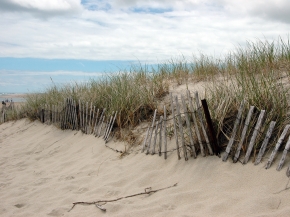Cape Cod Breast Cancer and Environment Study

In 1993, statewide data from the Massachusetts Cancer Registry showed breast cancer incidence rates were significantly higher on Cape Cod than in the rest of Massachusetts. Seven of the state’s ten highest incidence cities and towns were located on Cape Cod. A year later, Silent Spring Institute assembled a team of scientists to create the Cape Cod Breast Cancer and Environment Study in the hopes of learning what was contributing to the elevated rates. Researchers at Boston University, Tufts and Harvard universities, and elsewhere also joined the team.
The study grew out of a commitment by activists and legislators to bring rigorous scientific methods to the search for environmental links to breast cancer among Cape women. It has since become a national model for environmental health studies. Outcomes from the study not only have advanced our understanding of the environmental dynamics affecting the long-term health of Cape women, they have also provided public health researchers with new tools for studying disease.
Accomplishments include:
- Creation of a comprehensive source of information on the Cape environment through the development of a geographic information system (GIS). This integrated database is the first to be capable of assessing how Cape environmental factors might be associated with increased breast cancer incidence.
- Interviews with 2,100 Cape women—both those with and without breast cancer—to gather data on recognized risk factors, health histories, various habits and activities, and places of residence on the Cape for four decades.
- Development of scientific methods to test air, dust, water, and other environmental samples for estrogen mimics and other compounds that may be linked to breast cancer risk.
- Testing of in-home air and dust from residences of 120 study participants and established the presence of phthalates, alkylphenols, and other hormonally active compounds that may affect health.
- Identification of estrogenic activity in Cape groundwater, the source of drinking water for Cape residents.
- Discovery that, when established risk factors are controlled for, the longer women have lived on Cape Cod, the higher their breast cancer risk.
Funded by
News & Updates
2006
The Cape Cod Breast Cancer and Environment Study became a national model for environmental health studies, laying the groundwork for future investigations.